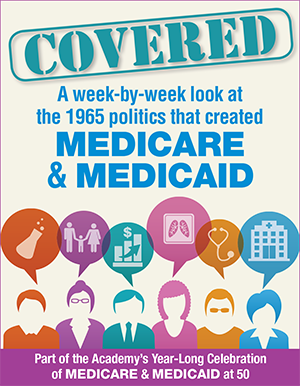Bob Rosenblatt, Special Correspondent
Throughout 2015, the Academy is working with partners to create a platform for dialogue around the history and future of these two vital programs, including this weekly Covered blog series. Covered is written by Bob Rosenblatt, a Senior Fellow at the National Academy of Social Insurance and editor of the website HelpWithAging. Learn more about the Academy’s celebration of the 50th anniversary of Medicare and Medicaid.
Medicare May Not End Welfare for People with Long Hospital Stays
By Bob Rosenblatt, Special Correspondent
May 8, 1965
Washington, DC – People over the age of 65 who require long periods of hospitalization or nursing home care will still depend on state welfare programs even when Social Security is expanded to cover hospital care, Johnson Administration officials admitted in a recent Senate hearing. The proposed Medicare program wouldn’t cover the full cost of caring for patients with “catastrophic illnesses,” said an exasperated Sen. Russell Long (D-LA) at an April 30 hearing of the Senate Finance Committee.
The House passed legislation in March to create Medicare as new part of the Social Security system, with workers and their employers paying taxes to finance a hospital insurance benefit for all Americans aged 65 and over. The proposal is likely to win Senate approval.
The Johnson Administration did not dispute the shortcomings of the legislation, Medicare was “not intended for those that are going to stay in institutions year in and year out,” Anthony Celebrezze, the Secretary of Health and Human Services (HEW) said at the Senate hearing. “It was never intended for that purpose. You can’t buy a hospital policy that will give you that kind of protection.” Medicare, the Administration contends, was intended to resemble commercial health insurance plans available to workers.
The new Medicare program would, if passed, pay for up to 60-days of hospital care and up to 100 days for a stay in a rehabilitation or nursing care facility for each spell of illness; it would also cover 100 days of home care visits after discharge from a hospital or a nursing facility.
Sen. Long expressed concern about people who are still sick and in the hospital or the nursing facility when the Medicare benefit period runs out. “What happens to Grandma?” he asked the HEW chief. “In arguing for your plan, you say let’s not strip poor old grandma of the last dress she has and of her home and what little resources she has and you bring us a plan that does exactly that unless she gets well in 60 days.”
The scenario Sen. Long described would be a relatively rare event, according to Administration officials. There will be few cases in which patients stay in the hospital for more than 60-days, said Celebrezze. Those people, if they are poor enough, will get the bills paid for through their state welfare programs.
The 1960 Kerr-Mills Act created a program called Medical Assistance for the Aged that provides federal funds for a state’s welfare programs. The new federal funding is explicitly intended to expand welfare to include the medical bills of poor people. But each state sets its own eligibility rules and only about quarter million people have qualified and most of those are in just five states (New York, Massachusetts, California, Pennsylvania, and Michigan). It was originally estimated that approximately two million people would benefit from state medical assistance programs.
The Medicare bill passed by the House in March also would expand the amount of funding provided to the states under the Kerr-Mills Act. Such funding would be specifically targeted at poor people under the age of 65. The Johnson Administration and congressional Democrats view Medicare as a progressive step to protect the health and the retirement security of people over the age 65.
The political difficulty the Administration faces in the Senate stems from the promotion of Medicare as a way to protect people financially from needing welfare. But the Administration concedes that Medicare may not protect the financial security of some of the sickest elderly who are likely to exhaust their benefits. The proposed Medicare program could have been made more generous, Administration officials admit – it’s a matter of funding, they noted in their testimony before the Senate Finance Committee.
The typical hospital stay of someone 65 or older is usually no more than 14 or 15 days; the 60-day limit was put in the bill to avoid “incentives that might encourage unnecessarily long hospital stays,” Robert M. Ball, the Social Security Commissioner, told the Senate hearing.
There are “very, very few cases that the professional people think ought to be in a hospital beyond 60 days,” Ball said.
The Administration did not provide estimates of the number of people over the age of 65 whose hospital stay might extend beyond 60 days, or who might exhaust their benefits for nursing facility care or for residential visits.
The hearings this week highlight that while Medicare promises to be a financial lifeline for millions of older people who need hospital care, that there will be a subset of the sickest and poorest who will likely become or remain welfare cases. What happens to them financially will depend on the state where they live. Crucial things like how much of one’s life savings must be used to pay hospital bills before assistance is available and whether one’s house is sold after a death to repay the state for the cost of care will continue to vary from state to state.
► Directory of COVERED posts
► Read the next post in the COVERED series, “Docs, Key Senator Back Drug Coverage in Medicare Proposal”
► Learn more about the Academy’s celebration of the 50th anniversary of the enactment of Medicare and Medicaid

